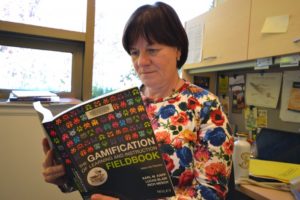The prospect of video games in classrooms seems like an absurd idea thought up by a group of nerds. But, in reality, video games are more popular than ever, and some innovation in our school system is long overdue; students have been writing tests, papers, worksheets, and everything else on paper and in Microsoft Word since they started school.
Camosun College recently changed some of their goals for the future of the college, and one of these goals was innovating learning techniques. While brainstorming ideas in a meeting, some Camosun staff thought up the idea of “gamification,” which is the concept of using video games for educational purposes.
Camosun director of learning services Sybil Harrison is involved in the project; after learning a bit about video games, she saw not only a future where games can be in classrooms but also a future where an actual work environment could possibly be provided through the cutting-edge technology of virtual reality.
“Not every student can get out there and have a co-op or have that sort of experience,” says Harrison. “Having opportunities around virtual reality or gaming can actually create these sort of real-world experiences in a way that we can’t do now.”

Although gamification in Camosun classrooms is only in its early stages, Harrison hopes that it will eventually be used for testing, among other things.
“There’s the idea of making tests more fun by using the idea of points, bonuses, levels, and those sorts of things,” she says. “We have the idea to use D2L, our learning management system, to really create these sorts of systems just to make learning a little more engaging, so it’s not your same-old, same-old quiz all the time.”
One concern about gamification is that it brings competitiveness to the classroom. Harrison says that could be tough for some students.
“I know for me, personally, when I think of being competitive in a situation like that, it leaves me feeling a little uncomfortable,” she says. “For some students, that’s really exciting, and that type of thing really appeals to their tastes. For others, that idea might be a turn-off, as they see it as their education and them learning, as well as something they want to keep between them and their professors only.”
This idea is only just hatching; Harrison says it may not actually hit classrooms for a couple of years, but she has high hopes for when it does.
“This idea that you could explore this whole other alternate world where you can love and be so involved with a certain story, and that there could then be a game and a whole other world you could create around that… the possibilities are just remarkable when we free ourselves from a book or a piece of paper that has just existed in just one dimension,” says Harrison. “We can take it to so many different levels now.”
